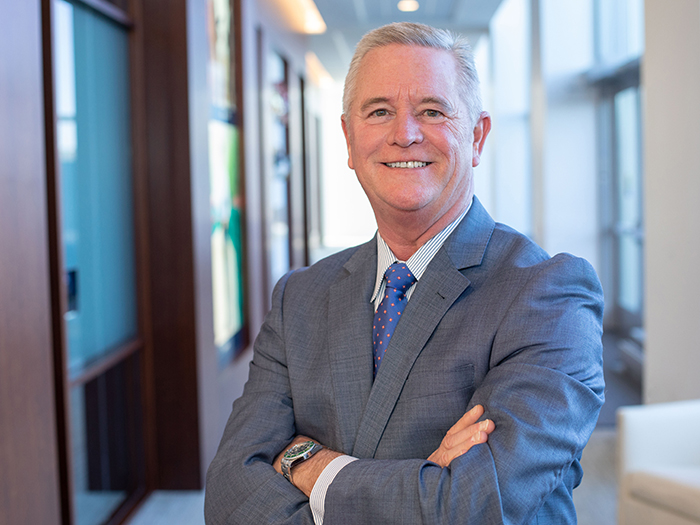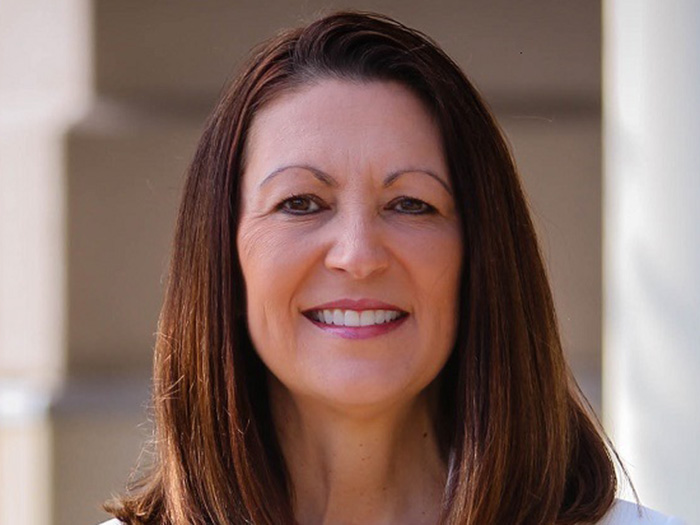9 Questions for RPS’ Joel Cavaness

This year, Risk & Insurance got the chance to catch up with Joel Cavaness, president of Risk Placement Services.
Cavaness shared some of his perspectives on the 25th anniversary of the company’s founding as well as additional observations about the insurance industry. Below is the results of that conversation, edited for length and clarity.
Risk & Insurance: Congratulations on the 25th anniversary of the company. What are your thoughts as you reach this anniversary?
Joel Cavaness: As the old song goes, “The days go by slow, but the years go by fast.”
That’s probably a very true statement. But we still get up every morning and look forward to the next day and what we’re going to be able to accomplish for our clients and where we’re heading strategically as a business. Twenty-five years goes fast.
R&I: How have you seen the wholesale industry change over the past 25 years?
JC: Twenty-five years ago the wholesale business, in general, was really fragmented.
There were a lot of us. No one, at that point, really dominated the landscape. There were some developments going on in the backdrop of things, but there were probably only five or six wholesalers doing a $100 million of premium, much less revenue. To do $100 million of premium 25 years ago was a pretty big deal.
The landscape was very different. The delegated authority space had a whole lot of family businesses all over the country, several in each state. But in the wholesale brokerage space, you couldn’t count them on two hands.
It’s a great business. You need talent, you need market representation, and then you need customers. It’s really not capital intensive. It’s just talent intensive. There were a lot of talented people who got into the business.
We used the term “The Wild Wild West” 25 years ago. Wholesalers were a little bit of a secret. If [agents & brokers] couldn’t get something done, or it was a little harried, or they needed help, they would come to an intermediary like a wholesaler but didn’t disclose there was an intermediary involved. It really wasn’t out in front.
It’s very, very different today. The industry has become exponentially more professional.
R&I: When you look back, are there some milestones where you were like, “Wow, this was a big one for us?”
JC: In our second year in business, we got into the binding business, into the delegated authority business, and that was truly a milestone for us.
At that point, absolutely no one with maybe one exception was really looking at that space. It was small business. It wasn’t sexy. It was a whole lot of small transactions. We were underwriting on behalf of a third-party insurance company … We were like, “Wow, we really like this.” When we were working on mergers and acquisitions, we started targeting MGAs.
Over time, we found a group of people who were all operating in different states or regions of the country. Collectively they were all friends; they weren’t competitors at all.
As we were merging with some, more wanted to join us because they wanted to join their friends. It was a very unique time in the company for us. It was an interesting time from 1998 to 2008, where we kept merging with friends and extended families. It was pretty cool.
We also had a really great milestone in ’05. We entered the program business, which is very popular today.
Then in 2015, we launched our first online digital platform to quote-bind-issue policies. We had a talented group of people who are still with us today, who led that vision of “how can I take a lot of the frictional costs out of small business transactions?” This platform thrives today.
R&I: When you look at how well things have gone, to what do you attribute that success? Where do you think you really got it right?
JC: Where we get it right is … really making sure we have the culture right, making sure that we’ve taken care of the folks inside of RPS.
We believe if we do that, they’ll take care of all the other stakeholders across our value chain.
If we take care of our employees, if we make sure that they’re well trained, well taken care of and respected, they’re going to take care of our markets. They’re going to take care of our customers.
R&I: You did mention, in relation to your success, about your online approach. What were the keys to making that work?
JC: Some talented people inside of our organization said, “Why is this application 50 questions long? Do we really need that much information in small business and small accounts, for people to make an underwriting decision?”
So, it was really being able to narrow the set of questions and find carriers willing to partner with us in this approach.
Our view on technology is to simplify.
We all only have 24 hours in the day. How can we take those 24 hours and make it the most efficient? Some people still want to talk to a person and … we want to talk to people, but if we can make the process simpler before we all have to talk, then it’s a better transaction all the way around.
R&I: We’re in a time right now where we’ve got a European war, we’ve got inflation, we’ve got a pandemic. We’ve got a lot going on. Going back over the years, looking at 9/11, and the crisis in 2008, how did you lead during those times? What were your challenges, and how did you overcome them?
JC: With a lot of help. You have to stay focused. You have to stay positive. I think a positive nature calms people down. You can’t run around with your hair on fire and expect anybody to follow you.
I think leaders can give people confidence to go on to the next thing in business. If everybody is totally freaked out, and you’re freaked out along with them, people typically are going to be unnerved and not get anything done because you’re only thinking about the situation.
Me, nor anyone, has been successful alone. It really takes that team of people. My job is being the coach of whatever team it might be. My job is to have the best people surrounding me. I believe I’ve accomplished that.
You ask about some of the things I’m proud of? I’m proud of the team we’ve been able to assemble together. We’re a very cohesive team. We get along well. You want to have a little bit of fun, too. You want to joke around. You want to have some comradery. No matter what the background, everybody still likes to have fun.
We really care about what happens to people. All this stuff that’s gone on in the last two years had a big focus on mental health. Corporately in May, we gave everyone a day off. We said, “Everybody gets a free day of mental health. Take the day off. Sit back at home, go to a ball game, go do something with your kids. Whatever it might be, take an extra day in the month of May to be able to just shut it down. Don’t turn on your computer. Shut it down, and give yourself some time.”
And we encourage our team leaders to do that for their teams as needed.
R&I: How do you retain, recruit and train under the current talent crisis? What’s working for you?
JC: It’s never been a secret for us. Obviously, being able to retain who you have is mission-critical, number one. You’ve got talented people — what are you doing to re-recruit those same people?
If there’s somebody you really want to join your organization, you’re going to take them to lunch or to dinner. You might take them to a ball game or go to play golf. You want to get to know them and tell them about the organization, so they will want to join the team.
If you have a whole bunch of team members, shouldn’t you really spend an equal amount of time with that kind of activity with your current people?
We call it re-recruitment. You’ve already recruited once, and you just need to make sure you’re re-recruiting those same people, every single day, to keep them on the team. That’s really been successful for us.
Our number one thing we do in recruitment is our internship program. This summer we have over 80 interns. We’re introducing people, not only to the insurance business in general but specifically to our industry and our company.
After they graduate from college, they are placed in our learning and development programs, which lasts three years … our retention and our success in that program is exceptional. Our ability to retain and hire ex-interns — externs is what we call them — has been highly successful and effective. We retain these people at over 75% after five years. We still have our first intern today, after 22 years. That’s pretty cool.
R&I: Technology is certainly something a leader has to give a lot of attention to. Where do you see technology really having traction, being worth the investment?
JC: As you said, there’s a lot of [money for technology] being spent well, and then there’s a fairly large chunk of it that’s not spent so well.
Let’s jump back five or six years when the Insurtechs were going to take over the world. In some areas, they probably had a pretty good product. Maybe they had a good carrier behind them or risk-taking vehicle behind them. What they probably underestimated was the value of distribution.
You can have the best thing in the world but if nobody’s there to sell it, you’re probably not going to do as well. We’re all underwriting, but we’re still salespeople. You need that part of that chain.
In my mind, when I think of technology, it is really a way to take some of the frictional costs out of the transaction.
We’re a complicated industry. We’re very regulated in many ways, unregulated in others, but there’s a whole lot that goes into actually issuing a contract of insurance. There’s a lot of steps. There’s a lot of information. The more we can grind that down, through technology, data, data scientists and the like, the better off we’re going to be.
We’ve really had a big focus on data and data collection and using that information to allow our customers to make better decisions. Using that kind of data to help customers sell more insurance is a great value.
We’re heavily invested in robotics. Using robotics takes the frictional cost out of the transaction. We’ve used it in rating programs. Through the robot, or robotic process, we can go into the rating engines of all these different insurance companies and get five quotes in the same amount of time it previously took to get one.
Again, this process is using technology to make the transaction more efficient and more effective for everyone.
R&I: When you think about inflation, supply chain issues, the war in Europe, or the pandemic, what do you see impacting the insurance industry, specifically, given all that’s going on?
JC: There is a lot going on.
A little bit of inflation is good. It’s good for our industry. Generally, big inflation is bad, because nobody really knows where your costs are going to go.
In our business, we’ve always priced a risk for today, not knowing what the cost might be in the future.
When we speak of social inflation, that’s a little bit of what’s going on today, we really didn’t price the business for the impact of certain social inflation factors that are causing some of the losses, or an elevated cost of the losses today.
We do a lot of trucking business, for example, so in this economy with the price of diesel, we do worry about our customer base and what that might do to the smaller scale trucking firms who are maybe locked into a freight contract.
We’re probably all sick to death of talking about the cost of cars and what that’s done to personal lines. We write a lot of personal lines, non-standard auto in RPS. That’s a very difficult point to be in with the cost of repair, the cost of a rental car, or the cost of a liability claim escalating quickly.
Indeed, it’s hard to get out ahead of, but we have the talent to be as prepared as we can be for our clients.
R&I: Looking across the business, what opportunities are you excited about?
JC: There’s always good mergers going on. I always get very, very excited about bringing new businesses and new folks into the company. If I think about the things that are happening, where I look, I always look towards people. I’m always pumped about that.
This industry’s fantastic and it’s exciting. People say: “Insurance, oh my God, it’s boring.” Really, it’s not. Even when I was an underwriter, almost 40 years ago, I got to see so many different industries and how they work.
I’m excited for the next generation of people that come into this industry.
I’m also excited about seeing how we’ll transact insurance in the next generation. Is it going to be data points? Is it going to be a trading platform to go in and buy property insurance and upper layers? Because it’s predominantly data points matching exposure to appetite through a data transfer. I’m excited to see if that will happen one day. I think that it probably will.
Going back to how do we better marry people and technology through transactions to make it as efficient as possible, you need to have talented people … smart people. You have to have people who have drive. That’s what gets me excited every day. &










